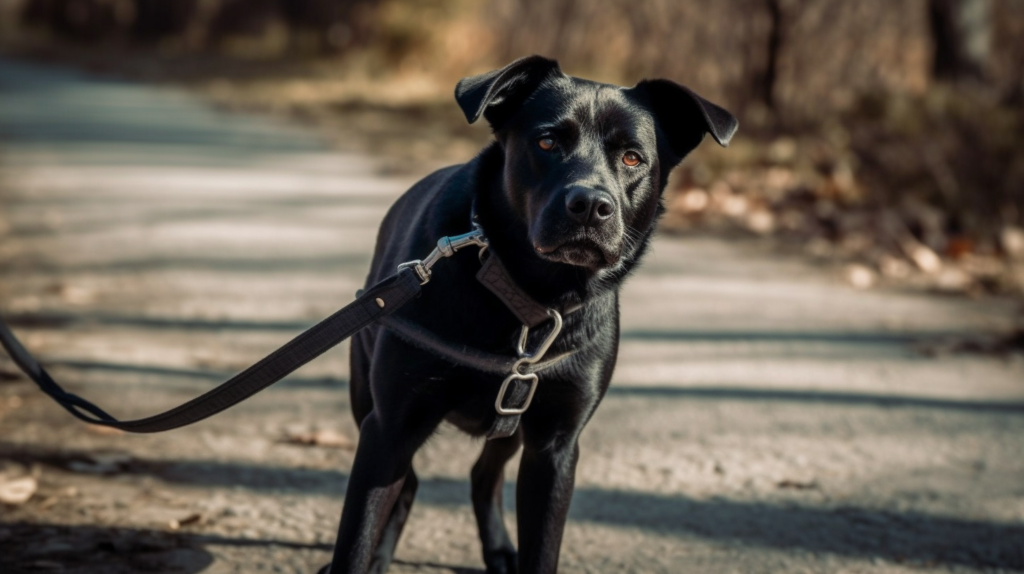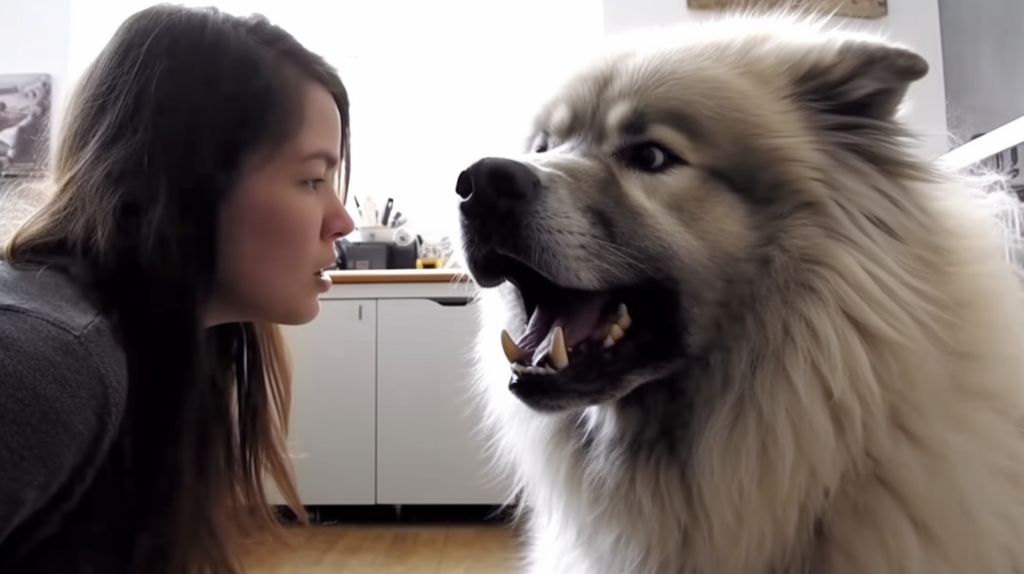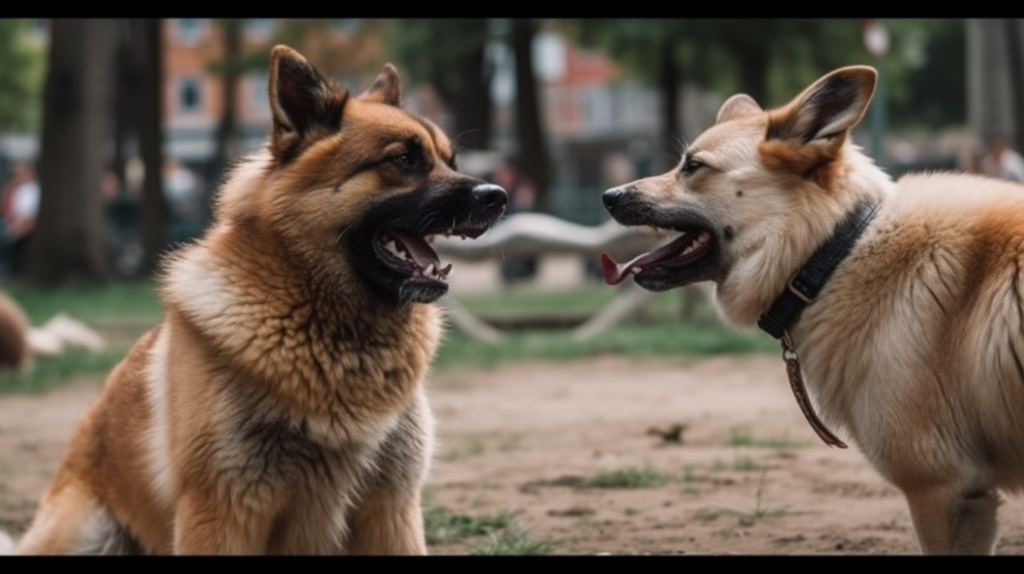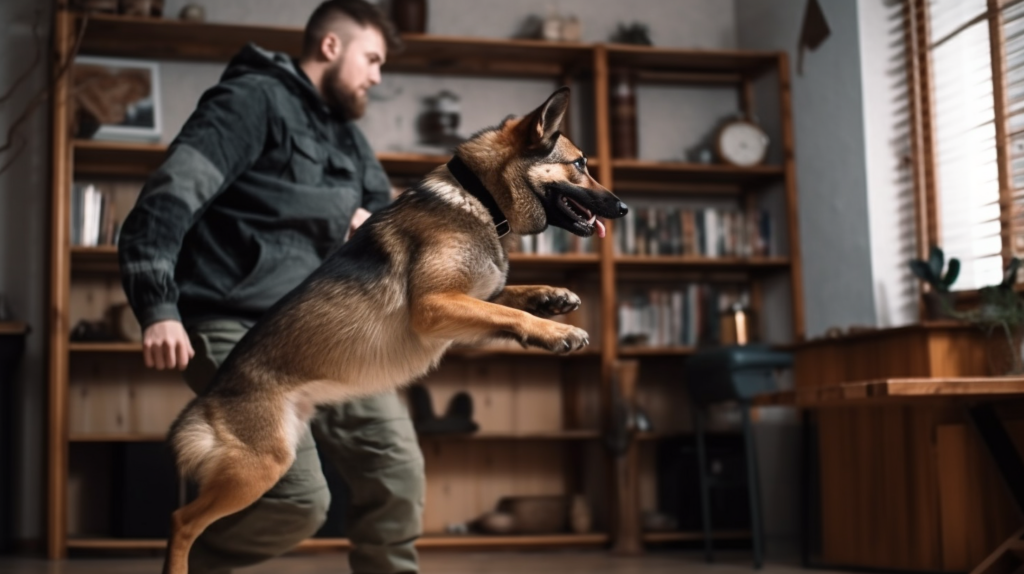
Strategies for Managing and Redirecting Your Puppy’s Aggressive Behavior
Are you struggling with your puppy’s aggressive behavior? You’re not alone. Many dog owners face challenges when dealing with their pet’s aggression, which can lead to various issues, including safety concerns and strained relationships. Aggressive behavior in puppies can stem from various factors, such as fear, territorial instincts, or lack of socialization.
At Paws of the Town (POTT), we understand the frustration and stress that come with managing a puppy’s aggression. That’s why we’re here to help you tackle this problem head-on with effective strategies and solutions.
The Problem:
As a dog owner, you may find yourself constantly on edge due to your puppy’s aggressive behavior. This aggression can manifest in various ways, including growling, biting, or lunging at people or other animals. Not only does this behavior pose a risk to others, but it can also cause emotional distress for both you and your pet.

The Consequences:
Aside from the immediate safety concerns, unchecked aggression in puppies can lead to more significant issues down the line. It can strain your relationship with your pet, making it challenging to build trust and bond effectively. Additionally, aggressive behavior can result in legal liabilities if your puppy injures someone or damages property.
We here at Paws of the Town are always dedicated to assisting our visitors with their dog-related concerns. If you’re seeking guidance on addressing and managing your puppy’s aggressive behavior, our team is here to help. With the expertise of our experienced trainers and behaviorists, we specialize in providing personalized strategies tailored to meet the specific needs of your puppy. We offer valuable advice, effective solutions, and ongoing support to ensure a harmonious and balanced relationship with your furry companion. Trust us to be your partner on this journey of addressing and managing puppy aggression.
Top Five Solutions:
1. Positive Reinforcement Training
Positive reinforcement training is a highly effective method for shaping your puppy’s behavior in a positive way. Here’s a detailed approach:
- Identify Desired Behaviors: Determine the specific behaviors you want to encourage in your puppy, such as sitting calmly or greeting people politely.
- Use High-Value Rewards: Use treats, toys, or verbal praise as rewards for displaying the desired behaviors. Choose rewards that your puppy finds particularly motivating.
- Consistency is Key: Consistently reward your puppy immediately after they exhibit the desired behavior. This reinforces the behavior and increases the likelihood of it recurring.
- Redirect Negative Behavior: Instead of punishing negative behavior, redirect your puppy’s attention to an appropriate behavior and reward them for it. For example, if your puppy starts chewing on furniture, redirect them to a chew toy and praise them for chewing on it.
- Ignore Unwanted Behavior: In some cases, ignoring unwanted behavior can be an effective way to extinguish it. For example, if your puppy jumps up on you for attention, turn away and withhold attention until they have all four paws on the ground.
2. Socialization
Socialization plays a crucial role in helping your puppy develop into a well-adjusted and confident dog. Here’s how you can effectively socialize your puppy:
- Start Early: Begin socializing your puppy as early as possible, ideally during the critical socialization period between 3 and 14 weeks of age.
- Expose to Various Environments: Introduce your puppy to different environments, including parks, streets, and indoor spaces. Expose them to various sounds, sights, and smells to desensitize them to new experiences.
- Meet Different People: Allow your puppy to interact with people of all ages, genders, and appearances. Encourage positive interactions by pairing meeting new people with rewards and praise.
- Introduce to Other Animals: Arrange controlled interactions with other dogs, cats, and animals to teach your puppy appropriate social skills. Supervise interactions closely to ensure safety.
- Positive Experiences: Ensure that all socialization experiences are positive and rewarding for your puppy. Avoid exposing them to overwhelming situations that could cause fear or anxiety.
3. Consistency
Consistency is essential in establishing boundaries and rules for your puppy. Here’s how to maintain consistency in training:
- Establish Clear Rules: Determine what behaviors are acceptable and unacceptable for your puppy. Set clear rules regarding obedience, house manners, and interactions with people and other pets.
- Communicate Effectively: Use consistent cues, commands, and body language to communicate your expectations to your puppy. Be clear and concise in your instructions.
- Enforce Boundaries: Enforce boundaries consistently by responding to unwanted behaviors promptly and consistently. Use positive reinforcement to reward compliance with rules.
- Involve Everyone: Ensure that everyone in your household follows the same rules and reinforces consistent behavior. Inconsistencies in training can confuse your puppy and undermine progress.
- Regular Training Sessions: Schedule regular training sessions to reinforce desired behaviors and address any issues that arise. Consistency in training helps your puppy understand what is expected of them and builds trust and respect in your relationship.
4. Exercise and Mental Stimulation

Regular exercise and mental stimulation are essential for keeping your puppy physically and mentally healthy. Here’s how to incorporate these into your puppy’s routine:
- Daily Walks: Take your puppy for daily walks to provide them with physical exercise and mental stimulation. Allow them to explore their surroundings and engage with different smells and sights.
- Interactive Toys: Provide your puppy with a variety of interactive toys, such as puzzle feeders and chew toys, to keep them mentally stimulated and prevent boredom.
- Training Sessions: Use training sessions as an opportunity to mentally challenge your puppy and reinforce positive behaviors. Teach them new tricks, commands, or obedience skills to keep their mind engaged.
- Playtime: Set aside dedicated playtime each day to bond with your puppy and provide them with physical activity. Incorporate games like fetch, tug-of-war, or hide-and-seek to keep them active and entertained.
- Rotate Activities: Keep your puppy’s routine varied by rotating different activities and environments. This prevents them from becoming bored or restless and encourages them to adapt to new experiences.
5. Seek Professional Help
If your puppy’s aggression persists despite your best efforts, seeking professional help from a qualified veterinarian or behavior specialist is crucial. Here’s how professional assistance can benefit you and your puppy:
- Expert Assessment: A professional can conduct a thorough assessment of your puppy’s behavior to identify the underlying causes of aggression.
- Customized Treatment Plan: Based on the assessment, the professional can develop a customized treatment plan tailored to your puppy’s specific needs and circumstances.
- Behavior Modification Techniques: Behavior specialists are trained in various behavior modification techniques, such as desensitization and counterconditioning, to address aggression effectively.
- Medication Management: In some cases, medication may be recommended to manage underlying medical or behavioral issues contributing to aggression.
- Ongoing Support: Professionals provide ongoing support and guidance throughout the behavior modification process, ensuring that you have the resources and assistance you need to help your puppy overcome aggression.
Implementation Assistance:
Now that you know the solutions, you may be wondering how to implement them effectively. Don’t worry; we’re here to support you every step of the way. Our team will provide you with the tools, resources, and guidance you need to successfully manage your puppy’s aggressive behavior.
About Us:
At Paws of the Town, we are dedicated to providing expert advice and recommendations to help dog owners address and manage their puppy’s aggressive behavior. With our years of experience and deep understanding of canine behavior, we are committed to assisting you in finding the right solutions.
We believe in sharing our knowledge and expertise to empower you as a dog owner. Our articles are carefully crafted to provide practical tips, effective techniques, and proven strategies for addressing puppy aggression. We offer insights into the underlying causes of aggression and guide you towards the appropriate resources and tools to tackle the issue.
At Paws of the Town, we don’t conduct training sessions ourselves. Instead, we point you in the right direction by recommending reputable trainers, behaviorists, and resources that specialize in addressing puppy aggression. We understand that each puppy is unique, and what works for one may not work for another. That’s why we strive to provide a range of options and guidance, allowing you to choose the approach that aligns with your puppy’s specific needs and your personal preferences.
Don’t let aggressive behavior overshadow the joy of pet ownership. At Paws of the Town, we are here to provide you with the knowledge and recommendations you need to confidently address your puppy’s aggression. Together, we can navigate this journey and help you create a harmonious relationship with your furry friend.

Benefits You Can Expect
Improved Relationship with Your Puppy: By implementing the strategies provided by Paws of the Town, you can expect to see a significant improvement in your relationship with your puppy. As you address and manage your puppy’s aggressive behavior effectively, you’ll build trust and strengthen your bond, leading to a more harmonious and enjoyable companionship.
Enhanced Safety and Peace of Mind: Dealing with a puppy’s aggressive behavior can be stressful and worrying, especially when it poses safety concerns for you, your family, and others. By seeking assistance from us, you’ll benefit from expert guidance and support, resulting in enhanced safety and peace of mind knowing that you’re effectively managing your puppy’s aggression.
Legal Protection and Liability Reduction: Unchecked aggression in puppies can lead to legal liabilities if your pet injures someone or damages property. By proactively addressing and managing your puppy’s aggression with our help, you can mitigate these risks and reduce the likelihood of facing legal consequences associated with your pet’s behavior.

Testimonials
“WOW! Wish we had had this info 3 years ago! In just the last few hours our sibling boys have lowered the intensity and length of barking episodes by at least 50%!!! I can’t wait to see the results a month from now!!”
Gary V. – Dog Owner
“Update on Ace – I have gotten him involved in playing some of the games and I can see a difference in his confidence already! My other dog played along and he became intrigued – now its a daily part of our routine – about 3 times a day we do the shell game and the muffin tin game. I am so grateful for coming upon your training techniques!”
Joanna A. – Dog Owner
“Since using Brain Training for Dogs my dogs are more excited to learn. They actively want to take part and figure out what they need to do! It’s not about ‘commanding’ that they perform a behavior, it’s about getting them thinking. I really love this approach to dog training and my dogs do too!”
Rosemary D. – Dog Owner
Let us be your trusted source of advice and assistance as you work towards resolving your puppy’s aggressive behavior and fostering a loving and balanced bond.

Here Is What You Get…
- Cutting-edge dog training science and techniques.
- Gentle force-free techniques ONLY.
- Clear instructions with pictures.
- Troubleshooting segments in the Brain Training course for difficult dogs.
- Video demonstrations of the brain training games.
- A HUGE archive covering almost every dog behavior problem you could think of.
- Tailor-made solutions for behavior problems which tackle the root cause.
- Exclusive information from a certified professional trainer with years of experience.
- Ability to submit questions directly to me for answering through my support system.
- A private forum where members can discuss dogs and dog training, or just chat and connect with like-minded people.
- An online member’s area which means you can easily access all of the information on the go.
